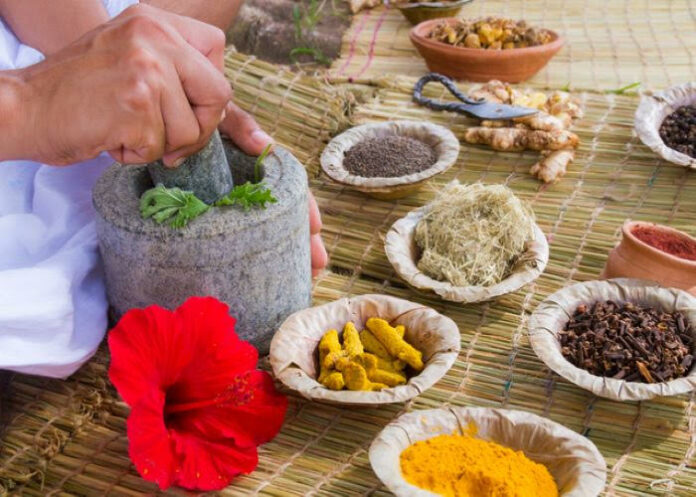A team of medical specialists has suggested that several traditional medicines widely used in South Asia can be effective in helping patients with type 2 diabetes manage their condition.
The study reviewed how medicines used in Ayurveda – a traditional medical system used in South Asian countries – are effective in controlling the blood sugar levels of people with type 2 diabetes.
Other benefits include positive effects on body weight, blood pressure, cholesterol and other diabetes-related symptoms.
Researchers from the University of Nottingham conducted the first comprehensive review on any traditional medicine, including Ayurveda, for this study.
The team, led by Dr Kaushik Chattopadhyay, associate professor in evidence-based healthcare at the university, examined a range of sources, including 18 electronic databases. In total, 219 articles were included in the review, which represented 199 randomised controlled trials involving 21,191 participants and 98 Ayurvedic medicines.
The research, which was published in the journal Frontiers in Pharmacology, reviewed Ayurvedic medicines containing plant, animal or mineral-origin ingredients, both single and in combinations.
According to the researchers, the traditional medicines is commonly used by South Asian patients “as it fits with their health beliefs and culture”.
Use of Ayurvedic medicines yields high levels of acceptability, satisfaction and perceived relief, particularly among rural, poor, older and indigenous communities. Ayurveda therapies include herbal medicines, medical oils, specialised diets, meditation, yoga and massages.
Chattopadhyay said: “This is the first time a thorough review has taken place looking at all of these medicines on a much larger scale. The current evidence suggests the benefits of a range of Ayurvedic medicines in improving glycaemic control in type 2 patients.”
He added: “Given the limitations of the available evidence and to strengthen the evidence base, high quality randomised controlled trials should be conducted and reported.
“As part of the funded project, we have developed a clinical guideline for managing type 2 diabetes by Ayurvedic practitioners based on this evidence and will be evaluating it.”
Study details
Effectiveness and Safety of Ayurvedic Medicines in Type 2 Diabetes Mellitus Management: A Systematic Review and Meta-Analysis
Kaushik Chattopadhyay Haiquan Wang, Jaspreet Kaur, Gamze Nalbant, Abdullah Almaqhawi, Burak Kundakci, Jeemon Panniyammakal, Michael Heinrich, Sarah Anne Lewis, Sheila Margaret Greenfield, Nikhil Tandon, Tuhin Kanti Biswas, Sanjay Kinra and Jo Leonardi-Bee
Published in Frontiers of Pharmacology on 8 June 2022
Introduction
Many Ayurvedic medicines have the potential for managing type 2 diabetes mellitus (T2DM), with previous systematic reviews demonstrating effectiveness and safety for specific Ayurvedic medicines. However, many of the reviews need updating and none provide a comprehensive summary of all the Ayurvedic medicines evaluated for managing T2DM.
Objective
The objective of this systematic review was to evaluate and synthesise evidence on the effectiveness and safety of Ayurvedic medicines for managing T2DM.
Inclusion criteria
Published and unpublished RCTs assessing the effectiveness and safety of Ayurvedic medicines for managing T2DM in adults.
Methods
The JBI systematic review methodology was followed. A comprehensive search of sources (including 18 electronic databases) from inception to 16 January 2021 was made. No language restrictions were applied. Data synthesis was conducted using narrative synthesis and random effects meta-analyses, where appropriate. Pooled results are reported as mean differences (MD) with 95% confidence intervals (CI).
Results
Out of 32,519 records identified from the searches, 219 articles were included in the systematic review representing 199 RCTs (21,191 participants) of 98 Ayurvedic medicines. Overall, in the studies reviewed, the methodology was not adequately reported, resulting in poorer methodological quality scoring. Glycated haemoglobin (HbA1c) was reduced using Aegle marmelos (L.) Corrêa (MD -1.6%; 95% CI −3 to −0.3), Boswellia serrata Roxb. (−0.5; −0.7 to −0.4), Gynostemma pentaphyllum (Thunb.) Makino (−1; −1.5 to −0.6), Momordica charantia L. (−0.3; −0.4 to −0.1), Nigella sativa L. (−0.4; −0.6 to −0.1), Plantago ovata Forssk. (−0.9; −1.4 to −0.3), Tinospora cordifolia (Willd.) Hook.f. and Thomson (−0.5; −0.6 to −0.5), Trigonella foenum-graecum L. (−0.6; −0.9 to −0.4), and Urtica dioica L. (−1.3; −2.4 to −0.2) compared to control. Similarly, fasting blood glucose (FBG) was reduced by 4–56 mg/dl for a range of Ayurvedic medicines. Very few studies assessed health-related quality of life (HRQoL). Adverse events were not reported in many studies, and if reported, these were mostly none to mild and predominately related to the gastrointestinal tract.
Conclusion
The current evidence suggests the benefit of a range of Ayurvedic medicines in improving glycaemic control in T2DM patients. Given the limitations of the available evidence and to strengthen the evidence base, high-quality RCTs should be conducted and reported.
See more from MedicalBrief archives:
Doctors in India protest over decision to ‘sanction quackery’
New CPD guidelines from AHPCSA for complementary medicine practitioners
British Heart Foundation predicts 29% rise in heart attacks and strokes linked to diabetes

